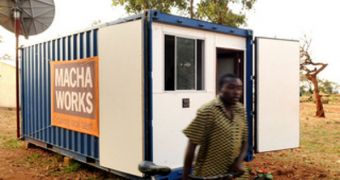Education is the first step towards progress, in every field of activity. Computer Aid is well aware of this; therefore, it plans to offer unprivileged children from African villages free access to computing rooms.
So far, the British organization has succeeded in sending eight solar-powered Internet cafes called ZubaBox, as part of a charitable mission started 18 months ago.
The plan is to change the lives of financially challenged people who can't even afford to pay for electricity.
Lack of money has been considered one of the main bumps in the road experienced by Computer Aid representatives. However, they are confident and hope to carry on with their plan and deliver more computing rooms starting next year.
"We'll be sending them to Zambia, Zimbabwe and Kenya, and they're due to be shipped in the third week of January," said Anja Ffrench, Computer Aid's director of communications for Business Green.
All in all, the solar-powered ZubaBox currently located in a remote village from Zambia has given a much-needed boost to the local communities, helping entrepreneurs expand their business and keeping teachers and pupils up to date with the most recent news.
Computing rooms appear to be the very best thing revolutionizing old teaching methods by combining modern technology with renewables and recycling strategies. The ZubaBox is made from old, no-longer-needed shipping containers equipped with solar panels to harness eco-friendly solar power.
Apart from helping kids receive a proper education and obtain well-paid jobs, the ingenious project also lends a hand to farmers in developing countries, helping them increase the productivity of their harvest offering them unlimited access to local weather forecasts.
The solar-powered Internet cafe seems to be a great tool in fighting poverty and improving the food security system in poor nations all across the Globe.
In order to achieve their ambitious goal and ship up to ten ZubaBoxes, the company needs 3,000 used computers and an extra investment evaluated at $25,000 (€19,140).

 14 DAY TRIAL //
14 DAY TRIAL //